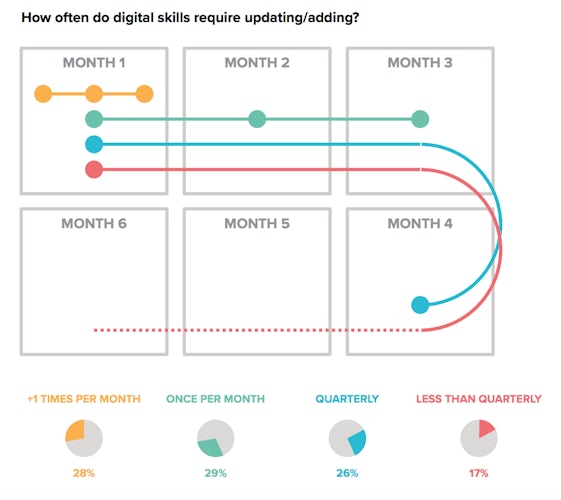Digital skills need adding or updating at least on a monthly basis, according to the majority (57%) of respondents in Econsultancy’s latest survey report.
When Econsultancy last carried out this research in 2019, the picture was very different. Then, the need to update skills even quarterly (or more frequently) was only identified by a third of respondents. In 2023, that figure has risen to 83%.
Report author, Econsultancy’s SVP Learning, Stefan Tornquist, writes, “Added to the number of new disciplines [in marketing, ecommerce and customer experience] is the increasing pressure on digital professionals to understand the mechanics of their trade: how the technology they use can be applied and what becomes possible as it evolves. This represents a new level of technical skill that was not required even a decade ago.”
Almost 1,500 professionals were surveyed in Q1 of 2023 across Econsultancy, Marketing Week and third-party audiences, including VPs and directors, management and below, and across roles in HR and learning and development (L&D). The new report, Winning the Race for Digital Skills, includes the results of this survey, alongside best practice guidance for building effective learning programs.

Speed of change
The speed at which new disciplines and new technology arise in marketing is perhaps best illustrated by Scott Brinker and Frans Riemersma’s Martech Map. What was, in 2011, an easily perused chart including 150 company logos is now an interactive graphic and accompanied database comprising 11,038 different martech solutions in many different categories.
Added to the number of new disciplines is the increasing pressure on digital professionals to understand the mechanics of their trade
Even with the evolution of low- or no-code tools, marketers still need to understand this tech within the context of strategy.
“Exponential technological change, digital transformation, shortening business lifespans and the increased importance of customer experience – mean that organisations and individuals need to adopt and maintain a learning mindset,” summarises Tornquist.
The 4C Model of Digital Upskilling
Econsultancy’s 4C Model for Digital Upskilling is featured in the report and defines an approach for L&D organisations. The model highlights ways to engage the highest share of employees in learning:
Adding digital skills is a continuous task
Tallying with the ‘at least monthly’ cadence observed in the survey results, the 4Cs describes digital upskilling as a ‘continuous’ task, requiring up-to-date learning materials in areas such as trends and tech, some level of personalisation for the learner and demonstration of progression.
Effective training is convenient
“The learning experience has to be intuitive and compelling enough to win the war for attention,” writes Tornquist.
Sixty-three percent of respondents to the survey say that they would prefer a mix of different learning methods in the training they receive, showing that learners respond best when they have different formats that can fit within their workday and digest information in the way they find easiest.
Connected learners are engaged
The 4Cs model posits that engagement increases when “learners connect to each other, instructors, experts and ultimately to the content itself.” Social elements added to an on-demand learning platform can increase retention and create institutional knowledge. As the report states, “Self-directed learning is convenient, but it’s easy to disengage from an isolated process.”
Cultural factors supercharge learning
“A company’s approach to employee development does not have to mirror its
larger culture, but it often does,” writes Tornquist. “Traditional and market-driven cultures tend to lean on compliance to drive learning, while collaborative and flexible cultures are more likely to use incentives and career planning.”
“Investment in learning is itself an expression of culture. Live, team learning may be the shortest route to instilling a powerful learning mindset, but all training should reflect core values of engaging and inspiring the individual while challenging them to add and use their new digital skills.”
For more on digital upskilling or building a learning organisation, download the report: Winning the Race for Digital Skills: The New Best Practices of Effective Learning.

Comments